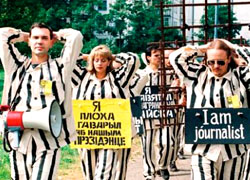In the latest case, Ivan Shulha, a journalist who works for the privately- owned satellite television station Belsat TV and who is an active member of the independent Belarus Association of Journalists (BAJ), was sentenced to 10 days in prison by a Minsk court yesterday on a charge of “minor hooliganism” in connection with an incident the day before, when he was arrested.
Judge Aksana Relyava’s refusal to allow a witness of the incident to testify is indicative of the way the courts are used by the authorities to silence independent media.
‘Attacked an officer’ Shulha’s (left) arrest came when a police unit tried twice to force its way into the apartment of another Belsat TV journalist, Mikhas Yanchuk, on the afternoon of 3 February.
Shulha’s (left) arrest came when a police unit tried twice to force its way into the apartment of another Belsat TV journalist, Mikhas Yanchuk, on the afternoon of 3 February.
The police, who had no warrant, said they were responding to a complaint from neighbours about noise. The journalists present in the apartment refused to open on the grounds that Yanchuk was absent. A nearly two-hour siege ensued in which the police cut off the apartment’s power supply.
Shulha, who had left the apartment seconds before the police arrived, reportedly called his colleagues by means of the intercom at the building’s entrance to alert them to arrival of the police. The police claimed that he attacked an officer. Their statements initially mentioned torn braid on the officer’s uniform and later talked of a broken leg. The police refused to say where they were holding Shulha until the start of the trial at noon the following day.
Few remaining
“Such cases do not increase the level of trust to the police and court  system. BAJ will follow the story of our colleague and will provide him with all the necessary support,” – said Deputy Chairman of BAJ Andrei Bastunets, right, said after the sentence to Ivan Shulha was announced.
system. BAJ will follow the story of our colleague and will provide him with all the necessary support,” – said Deputy Chairman of BAJ Andrei Bastunets, right, said after the sentence to Ivan Shulha was announced.
Like Belsat TV, which broadcasts from Poland, the BAJ is one of the few remaining entities that enable independent journalists to work in Belarus.
As well as monitoring and denouncing violations of free expression, the BAJ issues press cards to its members that allow them to avoid the strict procedure for accrediting news media and journalists. It also offers a legal assistance unit to journalists who have problems with the police.
It was these functions that deputy justice minister Aliaksandr Simanau took issue with in a 13 January directive. Arguing that it was not a news media, he ordered the BAJ to stop using the word “press” (and therefore stop issuing press cards). He also said its legal assistance unit was illegal as the BAJ statutes contained no provision for it.
Bastunets insists that the legal unit is envisaged in the BAJ statutes, which were approved by the justice ministry. “It is hard to image what violations the ministry has suddenly discovered in regulations that have been in place for the past seven years,” he said. The BAJ was initially given a month to comply but it has challenged the order and has requested clarification.
Media controlled Since its introduction a year ago under a new media law, the accreditation procedure has served the authorities as an effective mechanism for vetting news media.
Since its introduction a year ago under a new media law, the accreditation procedure has served the authorities as an effective mechanism for vetting news media.
After citing many different pretexts for not considering Belsat TV’s request for accreditation, the foreign ministry turned down its request for the second time in December.
Under a decree promulgated by President Alexander Lukashenko (Aliaksandr Lukashenka) this week, the Internet is to be subjected to the same controls as the traditional media from 1 July. The regime appears to be clamping down on all forms of access to news and information in the run up to local elections in April and a presidential election to be held in early 2011.





